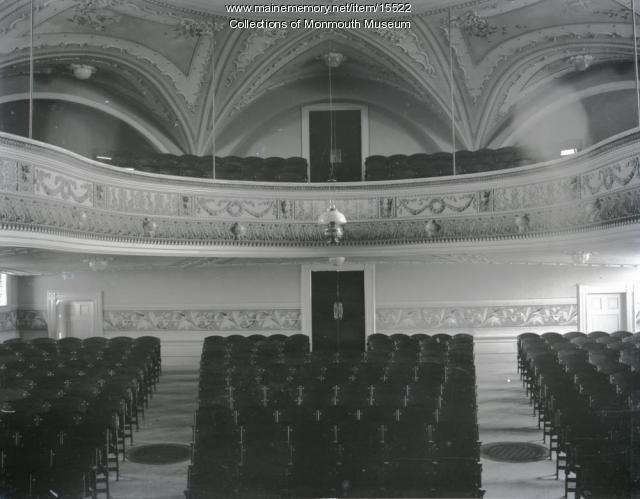Keywords: Festivals
- Historical Items (349)
- Tax Records (0)
- Architecture & Landscape (1)
- Online Exhibits (36)
- Site Pages (31)
- My Maine Stories (16)
- Lesson Plans (0)
Online Exhibits
Your results include these online exhibits. You also can view all of the site's exhibits, view a timeline of selected events in Maine History, and learn how to create your own exhibit. See featured exhibits or create your own exhibit
Exhibit
"We are growing to be somewhat cosmopolitan..." Waterville, 1911
Between 1870 and 1911, Waterville more than doubled in size, becoming a center of manufacturing, transportation, and the retail trade and offering a variety of entertainments for its residents.
Exhibit
Fair Season: Crops, Livestock, and Entertainment
Agricultural fairs, intended to promote new techniques and better farming methods, have been held since the early 19th century. Before long, entertainments were added to the educational focus of the early fairs.
Exhibit
Named for the two largest things in Maine at the turn of the 20th century, Mt. Katahdin and Granger of Stetson, were known as the Largest Oxen in the World. Unable to do farm work because of their size, they visited fairs and agricultural events around the Northeast.
Exhibit
Blueberries to Potatoes: Farming in Maine
Not part of the American "farm belt," Maine nonetheless has been known over the years for a few agricultural items, especially blueberries, sweet corn, potatoes, apples, chickens and dairy products.
Exhibit
Music in Maine - Bluegrass Music
"We met at the Salty Dog Festival in 1984, attended many festivals and were totally immersed—meeting other musicians, camping and playing music…"
Exhibit
Music in Maine - Community Music
"… Click to read about the North Atlantic Blues Festival The Roots of the North Atlantic Blues Festival By Paul Benjamin My parents brought me up on…"
Exhibit
Music in Maine - Community and School Marching Bands
"… 1914Maine Historical Society Film of band festival, Portland, ca. 1940 Watch high school bands including Portland, Deering, Cape Elizabeth…"
Exhibit
St-Jean-Baptiste Day -- June 24th -- in Lewiston-Auburn was a very public display of ethnic pride for nearly a century. Since about 1830, French Canadians had used St. John the Baptist's birthdate as a demonstration of French-Canadian nationalism.
Exhibit
Passamaquoddy Indians from Washington County traveled to Portland in 1920 to take part in the Maine Centennial Exposition. They set up an "Indian Village" at Deering Oaks Park.
Exhibit
"… East Coast performing at powwows, music and art festivals, and other events, sharing our style of singing."
Exhibit
A Celebration of Skilled Artisans
The Maine Charitable Mechanic Association, an organization formed to promote and support skilled craftsmen, celebrated civic pride and members' trades with a parade through Portland on Oct. 8, 1841 at which they displayed 17 painted linen banners with graphic and textual representations of the artisans' skills.
Exhibit
Hermann Kotzschmar: Portland's Musical Genius
During the second half of the 19th century, "Hermann Kotzschmar" was a familiar household name in Portland. He spent 59 years in his adopted city as a teacher, choral conductor, concert artist, and church organist.
Exhibit
Maine's Untold Vegetarian History
Vegetarianism has deep roots in Maine and this first-of-its-kind exhibition explores this untold story.
Exhibit
Music in Maine - Rock and Roll, Punk, and Elvis
"… and “Same Band promises to be nice as Maine Festival.” Most band members performed with stage names like Dual Space Organs (John Etnier), Swill…"
Exhibit
The astronomical arrival of winter -- also known as the winter solstice -- marks the year's shortest day and the season of snow and cold. It usually arrives on December 21.
Exhibit
Evergreens and a Jolly Old Elf
Santa Claus and evergreens have been common December additions to homes, schools, businesses, and other public places to America since the mid nineteenth century. They are two symbols of the Christian holiday of Christmas whose origins are unrelated to the religious meaning of the day.
Exhibit
Christmas, a Christian holiday observed by many Mainers, has a very public, seasonal face that makes it visible to those of all beliefs.
Exhibit
Cultures from the ancient Greeks and Chinese to contemporary societies have set aside time to give thanks, especially for the harvest. In 1941, the United States set a permanent date for the observance.
Exhibit
San Life: the Western Maine Sanatorium, 1928-1929
Merle Wadleigh of Portland, who was in his mid 20s, took and saved photographs that provide a glimpse into the life of a tuberculosis patient at the Western Maine Sanatorium in Hebron in 1928-1929.
Exhibit
Civil Defense: Fear and Safety
In the 1950s and the 1960s, Maine's Civil Defense effort focused on preparedness for hurricanes, floods and other natural disasters and a more global concern, nuclear war. Civil Defense materials urged awareness, along with measures like storing food and other staple items and preparing underground or other shelters.
Exhibit
Music in Maine - Opera, Orchestras and Stages
"… Portland’s first Maine Choral Association festival in 1897, where they billed Blauvelt as, “America’s favorite Concert Prima Donna Soprano.” Opera…"
Exhibit
A fire and two men whose lives were entwined for more than 50 years resulted in what is now considered to be "the Jewel of Portland" -- the Austin organ that was given to the city of Portland in 1912.
Exhibit
Lillian Nordica: Farmington Diva
Lillian Norton, known as Nordica, was one of the best known sopranos in America and the world at the end of the nineteenth and beginning of the twentieth centuries. She was a native of Farmington.
Exhibit
Scientist, author and explorer Donald B. MacMillan established Wiscasset as his homeport for many of the voyages he made to the Arctic region starting in the early 1920s.
























